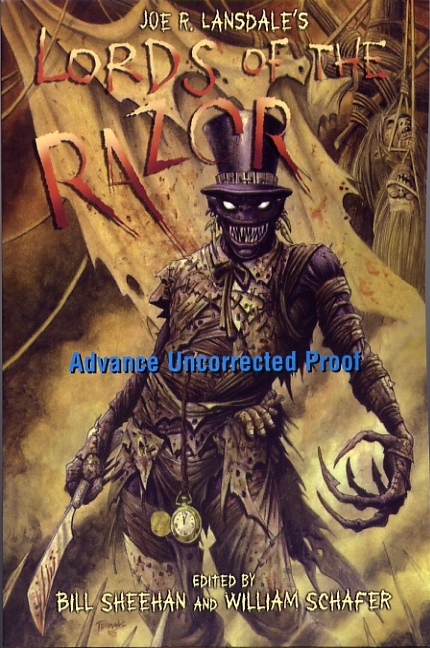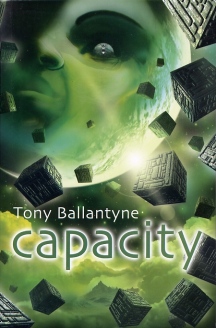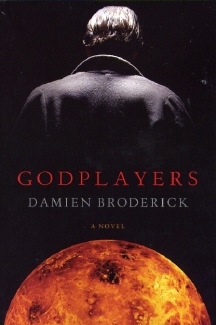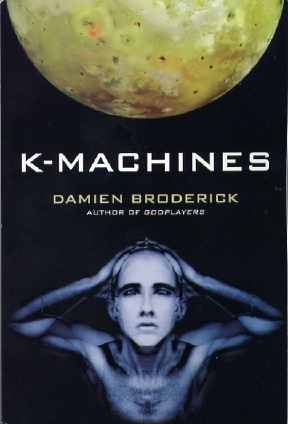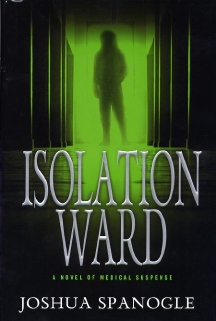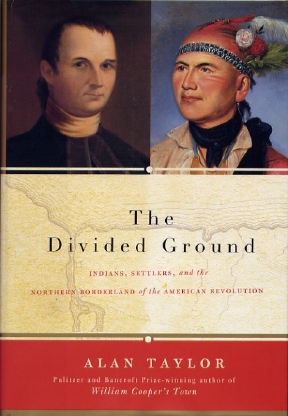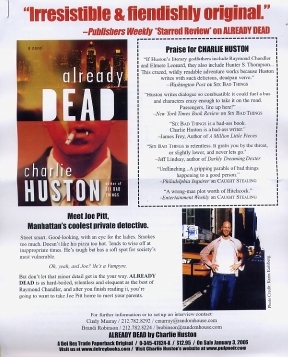|
|
|
This Just In...News from the Agony Column
|
02-24-06: Joe R. Landsale's 'Lords of the Razor' |
|||||
Casual,
Razor Blade Fridays
You know, it's just sort of becoming an unofficial tradition, here at the Agony Column. It just seems that the publishers line things up so that we start the week on the serious side with a compelling but nonetheless non-fiction tome along the lines of 'The Divided Ground' by Alan Taylor, and we end the week up with a sort of casual Friday feel brought to you by no less a set of luminaries than Joe R. Lansdale and Subterranean Press. And this Friday, what a treat. A trip down memory lane for some of us, back to the good old days of the 1980's when small press publisher Dark Harvest cut a swath of terror across the horror landscape by publishing the uncut version of Joe R. Lansdale's 'The Nightrunners'. But let me explain, at least to the best of my own destroyed memory.
Lansdale was new to me at least back then, and his combination of extreme violence, great prose and humor was a dark revelation. He was one of the original writers who helped supercharge the horror genre. I remember picking up the paperback copy of 'The Nightrunners' the novel that grew from a short story seed titled 'The Lord of the Razor'. Lansdale's creation was a coal-black icon, a reverse diamond at the center of the genre. The violence that he portrayed seemed gritty and real and his supernatural terrors seemed particularly everyday and believable. There was more than a scent of the forbidden lurking about his gripping, over-the-top fiction. But when these books are born, we never really know what will happen to them. Who would have guessed that 'Lord of the Razor' would reach the ripe old age of 21, old enough to drink in California, fercrissakes? Or that it would bear children at such a tender/old age? Well it has some yard apes now, tearing up the lawn and making an awful racket in 'Lords of the Razor' (Subterranean Press ; May, 2006 ; $100). If that one-hundred buck price is stopping your beating heart, cut the wussy behavior, OK? Back in the day, we shelled out a hundred bucks in a soon-to-be-stilled heartbeat for this kind of Lansdale action. No, I don’t remember what I paid for my Dark Harvest copy of the 'The Nightrunners'. But if I dropped a Franklin on it, I'd not be a bit surprised, and it's proved to be one hell of a good investment. Twenty damn years later, my brain is still warped as hell and I've only got Lansdale himself to thank for it.
So the kids, right? You want to know all about the Children of the Razor. Well, here’s the deal. The anthology is simply a collection of stories about the titular Lord of the Razor, ushered into this world grinning and dripping some twenty-plus years ago by hisownself Joe R. Lansdale. The collection is bookended by the one, the original 'Lord of the Razor' and a new novella, 'King of Shadows' by, well, a man who could rightfully claim that title himself, Lansdale. In between there are eleven other stories by a variety of writers from then and now. From then: Chet Williamson, Gary A. Braunbeck, Ardath Mayer, Elizabeth Massie, Stephen Gallagher, Thomas Tessier, Hugh B. Cave, P. D. Cacek. Now, Tim Lebbon, Bradley Denton, Christother Golden. Shoot me if you disagree with this then and now division, OK? Or better yet, someone else. Whatever, you've got the author list, and you've clearly got nothing but good, if bloody, awful and occasionally funny times ahead. Add to that knockout illustrations by Glen Chadbourne. Grab yourself a beer and a pair of those white Demo reading gloves, because, after all, it is twenty years later. You may not have grown up, but you've probably learned a lesson or two in the intervening years. Well, like as not you've not learned jack in those intervening years, but what the hell. You've got the gloves, right? Right? So get crackin' and order this sucker up. Back of the ARC says that there are only five hundred of these out there and I think probably five hundred of you sick SOBs who were driving up the prices back then have weathered the years, right? I dunno, and I sit down, I read something like "Jeaves and the Deteriorating Relations" by Williamson, and I think back to Williamson's Dark Harvest novel, 'Dreamthorp', where I first encountered the memorable image of someone with his intestines nailed to a tree, running around that tree to his (the character's) detriment, and I think, "Damn, we’ve all aged pretty well, eh?" I'm hoisting a beer as you read this, and I hope you will to. Here's to Joe R. Lansdale. Twenty more years of razor-sharp humor. Those cuts will heal. Or not. |
|
02-23-06: Tony Ballantyne Explores the Need for 'Capacity' |
|||
Welcome
to Your Digital Life
What's nice about the world of Tony Ballantyne's 'Recursion' and the follow-on novel 'Capacity' (Tor UK / Pan Macmillan ; November 18, 2005 ; £10.99)d, is that Ballantyne has a knack for evoking these details, for making the real life of even the pretty distant future seem nitty-gritty and everyday. Set in 2252 -- damn near * Trek territory, 'Capacity' offers a starkly different view of the twenty-third century. We're zipping about in space, all right, but not as part of a galactic version of the UN. No, accompanied by sinister robots and governed by seemingly omnipotent AI's, we're wandering about not only the real universe, but a variety of virtual ones as well. Say goodbye to your Atomic Body, and welcome to your digital life. Alas, Tor UK wasn't sending out ARCs of this or I'd have been all over it last year, because I really loved 'Recursion'. This sequel-of-sorts is another oddball combination of down-to-earth daily lives, outer space explorations and virtual shenanigans that asks the Big Questions while paying attention to the little details. As with 'Recursion', it unfolds through a series of parallel stories that eventually intertwine. Helen and the omnipotent Watcher AI; Judy the Social care operative and her many digital selves; Justinian Sibelius on the planet of Gateway, where AI's lose the only thing they have -- their minds. What draws the threads together? Ballantyne's elegant plot and prose. Ballantyne has quite a bit of fun combining traditional Space Opera and traditional (though it may sound like an oxymoron) Cyberpunk. Yes, the latter has been around long enough to have its traditions, in this case a variety of digital lives that stand in opposition to atomic, er real lives. So you get delicious chapter titles like: "The Atomic Judy." How can I resist a novel that includes The Atomic Judy? The answer is that I can't, I won't, I need not do so. I'll just spin off a digital version of myself, have it read the novel, then upload the experience afterwards. Oh wait, I'm not in Ballantyne's novel. Or am I? Yes, he does play with your reality in this manner, thus obviating your need to go back and re-read Philip K. Dick or Stanislaw Lem to get your daily dose of the rug-pulling of reality. Ballantyne's version is a little more peculiar, as unlikely as that seems. He's interested in those old core questions about what we are versus what we perceive and how the two intermix for a muddy very non-pristine creation. And he has a nice sense of humor, which you'll find in the opening. It's a sort of HOWTO live your digital life. 'Capacity' is the sort of sequel that to my mind may be read totally individually, without having read 'Recursion'. But that being said, I'd never recommend that you follow that path, because you'll miss out on layers and layers of richness and innuendo should you choose to do so. If you've not read the former, spin off a copy, have it read 'Recursion', then upload the reading experience. You'll have a decent idea of what awaits you in 'Capacity', assuming of course, your digital twin hasn’t decided to lie to you, or itself hasn’t spun off a digital twin to do its job while it did something nefarious to you. Am I growing recursive here? No, not at all. This is just the future of the beginning of this article, and as we all know, the future has more in common with the past than many science fiction novels would care to admit. |
|
02-22-06: Damien Broderick Unleashes the 'K-Machines' |
||||||
Cosmic
Conspiracies and Earthly Delights
There is a certain school of SF, and Sir Arthur C. Clarke springs to mind as one of the Prime Sources, that lives and dies by seriously blowing the mind, usually with grand visions of the universe as it relates to some astronomical phenomenon or event. Make no mistake, I love this kind of material and cut my teeth as an SF reader on works like 'Childhood's End'. Then there is a similar school of SF, and here Philip K. Dick, Roger Zelazny and Damien Broderick spring to mind, where grand conspiracy themes take the place of the cosmic events in Clarke's (for example) work. Here the mind is blown not by the scale of the universe versus the scale of the personal, but rather, by what happens when human scheming gets kicked up to the next level. These books tend to be a bit more, well, fun-oriented than their astronomical counterparts, as humans seem ill-suited to run a company, a country or a planet. Set them loose to finagle and finesse their way through multiple universes and dimensions and try, I tell you, try to keep a straight face. Oh those silly monkeys!
Well, someone a little more trustworthy and steadfast at your side than Lune, the beautiful woman who OF COURSE proves to be more complicated than August had previously imagined. Broderick's novels like to throw big ideas at you, but in a psychedelic, mind-melting sort of way. Broderick offers the "alternate dimension" version of the harder science fiction speculation usually associated with the genre. Readers who like their novels to be the written equivalent of a spiked sugar-cube are well advised to pick up 'Godplayers' knowing that the sequel, 'K-Machines' is already in stores. The jaunty pace of the release of these novels suggests that Broderick knows exactly where he's going, which in terms of the picture of the universe he paints, puts him somewhere a couple steps above, uh, let's just call them deities, shall we? But then what better profession for one who wants to play at being god than writing, no? While I'm at it, let me hasten to mention that Thunder's Mouth Press is rapidly becoming one of the most important publishing outlets for readers to keep an eye trained on. They've got a great stable of writers, including Lucius Shepard, Damien Broderick, Steve Aylett and Paul Di Filippo, and a willingness to venture into really interesting territory. In fact they seem rather bent on going where other publishers might fear to tread. Moreover, they’re making some very solid trade paperbacks. They're easy-to-read, pretty inexpensive and nicely designed. In 'K-Machines', they'll give you Yggdrasil and Rodin on the same page, and this epigraph from Emily Dickenson: I like a look of Agony Because I know it's true. Of course, truer words have never been spoken! Always trust the classics, as they will never let you down. Until of course, some Big Idea dissolves your universe. Or the TV starts talking to you, and when that happens, you’d be well advised to hold your experiences close. |
|
02-21-06: Joshua Spanogle Enters 'The Isolation Ward' |
|||
Can
You Hard Boil A Medical Thriller?
But by the time the rest of the world was agog over Robin Cook's medical thriller, 'Coma', I was over medical thrillers. Ever since that time, medical thrillers to me have seemed simply, unutterably bland. It doesn't matter how gruesome they are, it doesn't matter how threatening the diseases within are. They all seemed to consist of a series of uninteresting pieces; driven young doctors, scheming older doctors, and innocent victims. And yet, there's nothing inherently wrong with the idea of the medical thriller. But the publishing world has taken the thrills out of it by making it as formula oriented a product as the Generic Celtic Fantasy clone. You can go the horror route and natter on about the disease, or you can go the nice-guy route and natter on about duty and etc, etc. But Joshua Spanogle says just enough to make me think that he might be able to cure what's ailing the modern medical thriller. 'Isolation Ward' (Delacorte / Bantam Dell / Random House ; March 7, 2006 ; $22.00) might look a bit on the bland side. Greenish cover, and the blurb talks about yet another hemorrhagic disease -- yes you might think you've heard it all before. But if you punt the DJ blurb and head for the text, you'll find a hard boiling going on that makes this novel a lot more appealing and vaults it out of the pile of generic medical thrillers. Yes, the setup is pretty typical and that's not necessarily bad. Disease kills some folks. OK, fine. But as ever, what matters here is not so much subject as execution, and this is where Spanogle brings out a bit of the hard-boiled detective litrachur that all of a sudden piques one's interest. For Nathaniel McCormick, CDC investigator is not a dedicated young nice guy, just trying to set the world right. He's a bit of a bastard, is Nate, a liar, a thief if need be. That whole ethics aspect of the medical profession appears not to have fully taken in Nate's case, and it's all for the better for this character. Moreover, here's that utterly rare novel that uses the fallout from Our Recent Troubles with a bit more flair than one is likely to find in fiction that refers to ORT. Suffice it to say that an interesting character can bring a novel alive, and it doesn't matter how hidebound the genre might be. The medical thriller is at this time almost by definition deadly dull, and so it's nice to see someone inject some life into it the old-fashioned way; decent writing. It certainly helps that Spanogle has not manage to inoculate his sense of humor as well as leaving the ethics guide at home. A few dark jokes go a long way in world where most of the characters just want to help. Between a character who is not afraid to be bad to do good and the ability to laugh at, well, things one might not usually laugh at, Spanogle has a great head start on most of his fellow practitioners of medical thrillers. Yes, he does have the prerequisite experience; he wrote this novel while doing 17-hour days in med school at Stanford, not exactly a shabby place to get your shingle. So the nitty-gritty that is required is sure to be there, but it's the attitude -- the bad attitude -- that interests me. In fact, I'd like to see this taken up and taken farther. After all, the only reason we see so much idealism in the medical thriller genre is that thus far, idealism has been the only game in town. Going with a sell-more-of-what-sells orientation, the publishers have run that game into the ground. It's going to be fun to see if this doctor can single-handedly resuscitate a moribund sub-genre. Of course, here's a situation where failure has offered many the greater reward. Not an encouraging sign of life, but any signs of life are welcome. |
|
02-20-06: My Life in the Bush of Books Part 17; Gruesome Quadruple Homicide |
|||
'The Divided Ground' by Alan Taylor
And obviously, this is one of the reasons why. Here I am living in la-la land, in Retro-Pulp World, in fabulist memory land, everywhere but the real damn world and then this book-brick almost literally hits me upside the head (had the guy tossed the book out his van window, newspaper-style, it would have hit me upside the head and hurt like hell) with a big old dose of "Why Reality Is Every Bit as Fascinating as Fiction". So why is... I'll tell you why, you know that. The reason why is that reality, which seems so well trod, so well known is in fact as much terra incognito as any fiction nestling in the brain of some author. And this book offers more startling and to my mind entertaining proof of just that presumption, while the book undermines one of our most common presumptions, to wit, our concept of the colonization of America. But it does so by following two fascinating characters in their journey across a nascent America. It starts in 1761, when a Mohawk Indian named Joseph Bryant (!) meets Samuel Kirkland, the son of a colonial clergyman. Their long and intense relationship is a lens through which we can learn yet another wrinkle in the old settlers versus Indians battle. They started out as friends, but ended up as implacable enemies. Kirkland followed a course you might expect. He wanted convert Indians to Christianity and snag their lands. But Bryant had a rather different idea. He envisioned an Indian homeland between the American settlers in the south and the British in Canada in the north. What proves to be the case is that the settlers wanted to constrain the Indians to reservations, in part to keep control of the northern border. The settlers would surround the reservations with farms. It was private property, private AMERICAN property that held firm the line to the north. Of course the Indians weren't too happy about this. They had imagined this to be their own land, and had pursued some tactics that well, this is the first I've heard about them. For one, Bryant, at least, put forth the idea that the Indians would lease land to the settlers, not just give it or sell it. You can imagine an alternate present based on this, can't you? And, yes, I'm sure some enterprising alternate historian will do just that, but you can read about REALITY, equally original, here first. But what makes this book work for me is the focus on two characters, two men who met early on and kept meeting throughout their lives, often on opposite sides. And then there's the final little wrinkle, the way in which those moving out across the land sought to assert their ownership thereof. In part they did this by prosecuting murderers, each in their own fashion. The settlers went for the traditional, kill 'em. The Indians pursued their own sense of justice, which involved covering the graves of victims with any possessions of the killers. We know, of course, who won, but this book demonstrates that there's still a lot we do not know. Ever and anon, it seems, our ignorance as to the nature of the Indians shall be revealed. Taylor presents them as wily wheeler-dealers, a smart bunch of people who tried to manage the settlement --which they viewed as inevitable -- rather than simply to fight it. But no settlers were going to accept the Indians as landlords. All this as Bryant and Kirkland clash over the course of fifty years. Big personalities and history we do not know. Four hundred pages of terra incognito, illustrated, annotated and footnoted. Reality re-written for today. This is why we love books! |
|||
A Conversation with Charlie Huston
So, Charlie was really, really nice and agreed to talk to me on Thursday. I frankly didn't expect to get much of an interview, but he's so interesting that I got a phone equivalent of the full-blown interview I usually do. Now, I know, the audio quality is a bit dodgy, and I'm working on improving it. I have a couple of options I'm exploring, and you'll no doubt see the results here in the Fullness of Time. In the interim, here are links to MP3 and RealAudio versions of the interview and an MP3 version of the review. Enjoy this interview, but recall that my podcast is tagged "explicit" for a reason, and the reason is that I get to do interviews such as this. Next week, I suspect, we'll be feeling quite a bit more proper when I talk to Julian Barnes and review 'Arthur & George'. |
